
The false stag beetles (Diphyllostoma) are a group of three species of rare beetles known only from California. Almost nothing is known of their life history beyond that the adults are diurnal and females are flightless; larvae have not been observed.
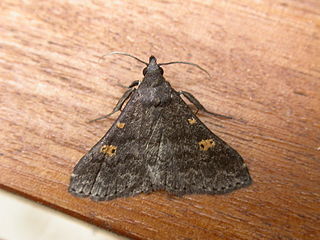
Naarda is a large genus of erebid moths which currently encompasses 108 species. Initially identified by Francis Walker in 1866, it is in the family Erebidae. Somewhat ruddy in appearance, this genus is primarily distinguishable for its generally slender thorax and abdomen, and straight, porrect labial palpi. Most species are dark beige, but shading can reach a deep charcoal. Most species possess muddy yellow, reniform, orbicular stigmata featured on the forewings, which is reflected bilaterally superior on some species.
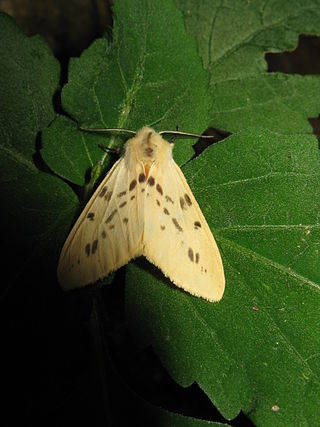
Lemyra is a genus of tiger moths in the family Erebidae. The genus contains many species from East and South Asia, Sundaland and Australia. It was described by Francis Walker in 1856.

Lyclene is a genus of lichen moths of the family Erebidae, subfamily Arctiinae. The genus was erected by Frederic Moore in 1860.

Parasa is a genus of moths of the family Limacodidae. It was described by Frederic Moore in 1860.
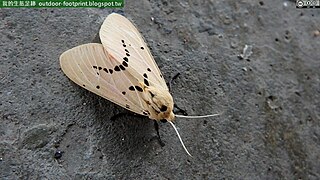
Spilarctia is a genus of moths in the family Erebidae. The genus was erected by Arthur Gardiner Butler in 1875.

Teulisna is a genus of moths in the family Erebidae. The genus was erected by Francis Walker in 1862. They are found in Sri Lanka, India, Myanmar, Borneo and Java.

Diarsia is a genus of moths of the family Noctuidae.
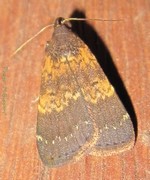
Hydrillodes is a genus of litter moths of the family Erebidae first described by Achille Guenée in 1854. Its validity is somewhat disputed.
Luceria is a genus of moths of the family Erebidae. It was described by Francis Walker in 1859. This genus is found in southern Asia, Australia, on several Pacific islands and a few species also in Africa.

Arctornis is a genus of tussock moths in the family Erebidae, the namesake of the tribe Arctornithini, and disputedly the sole genus in the tribe. The genus was erected by Ernst Friedrich Germar in 1810.

Plutodes is a genus of moths in the family Geometridae erected by Achille Guenée in 1857.

Sterrhinae is a large subfamily of geometer moths with some 3,000 described species, with more than half belonging to the taxonomically difficult, very diverse genera, Idaea and Scopula. This subfamily was described by Edward Meyrick in 1892. They are the most diverse in the tropics with the number of species decreasing with increasing latitude and elevation.
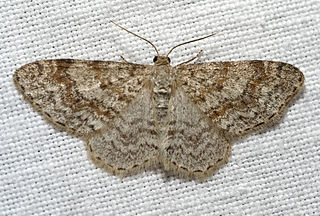
Asthenini is a tribe of geometer moths under subfamily Larentiinae first described by Warren in 1893. The tribe has been combined with Eupitheciini in the past, most notably by Jeremy Daniel Holloway in his work The Moths of Borneo.

Dysaethria is a genus of moths in the family Uraniidae. It was described by Turner in 1911. The species of this genus occur mainly in Asia and in Australia.

Demonarosa is a genus of moths in the family Limacodidae from Asia.
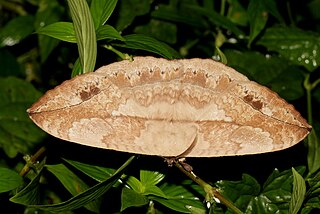
Eupterote is a genus of moths in the family Eupterotidae. It was first described by Jacob Hübner in 1820.
Cerius otagensis is a species of flightless fungus weevil that is endemic to New Zealand. It has been found in only two locations in the Central Otago region.
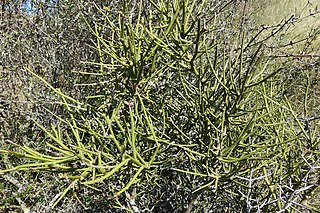
Carmichaelia petriei is a species of New Zealand broom in the genus Carmichaelia. It is endemic to New Zealand. C. petrieis is possibly a host plant for the critically endangered fungus weevil Cerius otagensis.
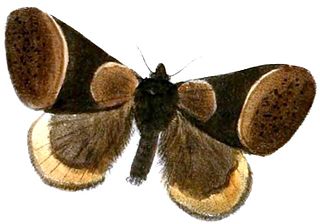
Pseudobistonidae is a family of Asian moths in the superfamily Geometroidea. It was erected in 2015 and contained Pseudobiston pinratanai as its only species. A second species was moved into this family in 2019: Heracula discivitta, in a new subfamily called Heraculinae.

















